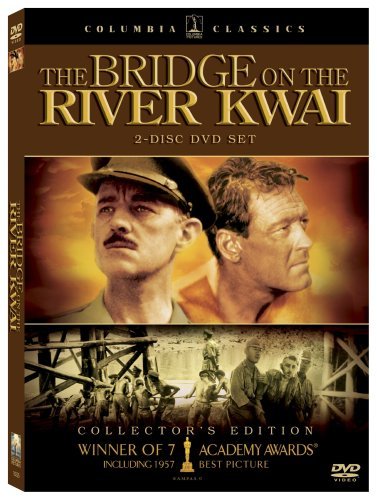Released in 1957, “The Bridge on the River Kwai” stands as an enduring masterpiece of cinema, captivating audiences with its epic scope, riveting storytelling, and profound exploration of war, honor, and the human condition. Directed by the legendary filmmaker David Lean and based on the novel by Pierre Boulle, the film unfolds against the backdrop of World War II, chronicling the construction of a strategic railway bridge by British prisoners of war (POWs) in Japanese-occupied Burma. As the narrative unfolds, themes of duty, loyalty, and morality are intricately woven into the fabric of the story, culminating in a breathtaking climax that leaves a lasting impression on viewers.
Plot Summary:
Set in 1943, the film follows the experiences of British Colonel Nicholson (played by Alec Guinness) and his men, who are captured and interned in a Japanese POW camp in Burma. Tasked with building a railway bridge over the River Kwai to support the Japanese war effort, Nicholson initially resists cooperating with his captors, citing the Geneva Conventions. However, as the film progresses, he becomes increasingly obsessed with the project, viewing it as an opportunity to showcase British engineering prowess and uphold notions of discipline and pride.
Meanwhile, American prisoner Shears (played by William Holden) manages to escape from the camp but finds himself reluctantly drawn back into the conflict when he is recruited by British commandos to sabotage the bridge. As tensions escalate and loyalties are tested, the stage is set for a dramatic showdown between duty, honor, and survival.
Themes and Analysis:
At its core, “The Bridge on the River Kwai” explores a myriad of themes that resonate with audiences on both a personal and universal level:
- Duty and Honor: Colonel Nicholson’s unwavering commitment to duty and honor drives his actions throughout the film, highlighting the complexities of moral integrity in the face of adversity.
- The Folly of Pride: Nicholson’s obsession with the bridge symbolizes the folly of unchecked pride and ambition, leading him down a path of moral ambiguity and self-destruction.
- The Human Cost of War: The film vividly depicts the physical and emotional toll of war on individuals, highlighting the sacrifices made by soldiers and civilians alike in the pursuit of victory.
- The Triumph of the Human Spirit: Despite the horrors of war and captivity, the resilience and courage of the characters shine through, serving as a testament to the indomitable nature of the human spirit.
Performances and Direction:
Directed with masterful precision by David Lean, “The Bridge on the River Kwai” showcases the filmmaker’s unparalleled talent for crafting epic narratives that resonate on both intimate and grand scales. Lean’s meticulous attention to detail, breathtaking cinematography, and sweeping vistas transport viewers to the heart of the Burmese jungle, immersing them in the brutal realities of war and captivity.
The performances in the film are nothing short of extraordinary, with Alec Guinness delivering a tour-de-force portrayal of Colonel Nicholson that earned him an Academy Award for Best Actor. Guinness’s nuanced performance captures the complexities of Nicholson’s character, from his initial stoicism and defiance to his eventual descent into obsession and madness. William Holden brings depth and humanity to the role of Shears, portraying a reluctant hero grappling with his own demons and motivations.
Legacy and Impact:
“The Bridge on the River Kwai” remains a towering achievement in the annals of cinema, garnering widespread critical acclaim and leaving an indelible mark on audiences and filmmakers alike. The film received numerous accolades, including seven Academy Awards, including Best Picture, Best Director for David Lean, and Best Actor for Alec Guinness.
Conclusion:
In conclusion, “The Bridge on the River Kwai” (1957) stands as a timeless testament to the power of storytelling, craftsmanship, and the human spirit. With its sweeping vistas, gripping narrative, and powerful performances, the film continues to captivate audiences with its exploration of war, honor, and the complexities of the human condition. As viewers traverse the cinematic landscape of “The Bridge on the River Kwai,” they are reminded of the enduring power of cinema to provoke thought, evoke emotion, and illuminate the depths of the human experience. Truly, it is a cinematic journey that transcends time and leaves an indelible impression on all who embark upon it.
